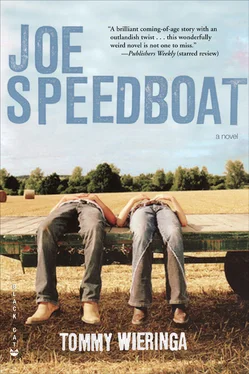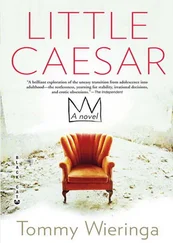What I liked most was sitting by the river with Mahfouz, to whom I didn’t have to explain a thing. The sun glanced off the water; the light was so bright that it lit up the inside of your head and everyone could look right in.
We sat there like that often, the Egyptian and I, drifting off into the soothing narcosis of daydreams that comes over you when you stare for a long time at waves or a fire. Piet came and Piet went, a car honked as it passed, and from the willows on the shore white fluff blew out across the river, settling on the water or floating to the other side. Housewives complained when the willows gave off their fluff, sometimes there was so much that it piled up in their doorways and blew into the house as soon as it got the chance. Mahfouz’s mind was somewhere completely different, maybe he was thinking about where he came from and the strange wind that had carried him here, to these basalt blocks in the company of Frank the Arm.
Out on the river there were lots of private boats, those floating fridges that illustrate to us how general prosperity and bad taste go together like salt and pepper. Sometimes an old-fashioned saloon boat would come by too, with people on board in sporty clothes with blue or aubergine-coloured stripes. They came from another world and drifted past ours with conspicuous lightness. There was a kind of yearning in the way the people looked from their boats at the shore, just as there was a kind of yearning in the way I looked back. They often waved.
I knew that boating enthusiasts liked to wave to each other and to people on the shore. Drivers and cyclists never waved to each other, but motorcyclists did. Because of that waving, boaters and motorcyclists enjoyed some secret connection. Once in a while Mahfouz would wave back, without interrupting his musings. Sometimes he also made muffled sounds, as though agreeing with himself in some inner conversation, and when he did the plucking at his moustache grew more rigorous. I could see why Regina was in love with him — he had lustrous black hair and deep, dark eyes with lots of white around them, like the Tuaregs in National Geographic with their blue scarves that leave only their eyes uncovered.
‘In Nuweiba there was a pelican,’ Mahfouz told me once. ‘Big, white. One day he came out of the water and never went back. Maybe he’d had enough of living at sea and decided that he wanted to live among people. He ate of our meat, our bread and our fish. Tourists came who wanted to have their pictures taken with him. Sometimes we would build a fire at night and he would float close by, so he could keep an eye on us.’
At this point in the story the Arab pulled out a ragged pack of Cleopatras and patted the filter against his left thumbnail. He lit it, then remembered that I was there too. We smoked. Some smokers exhale smoke like it’s coming from a plane, a straight, gray contrail, but I’d never seen anyone smoke the way the Arab did — he smoked, how shall I put it, to vanish . He took a dollop of smoke in his mouth and let it eddy up around his face the way clouds rise to hide a mountaintop from view. Is that the way they smoked where he came from? It was something to see. He seemed to have forgotten what he was saying about the pelican, in any case he’d squatted down again and was watching the boats with his face regularly eclipsed in cloud.
After some time had passed in that way, Mahfouz started talking again, about back when the tourists had avoided his country because of the situation in Israel, and how all of them grew a lot skinnier as they waited for better days.
‘Imagine you are a sailor,’ he said, ‘and suddenly the wind is gone. Your ship just lies there in the middle of the sea and all you can do is pray for wind. . That’s how it is with the merchant, too; he tightens his belt and looks on high until Allah remembers him. We waited like seeds in the desert for rain, for better times. And our pelican waited too. But we had to eat first. After all, he had the whole sea full of fish, no? But then he stopped waiting until he got something, and started stealing.’
Mahfouz looked at me sternly.
‘Dependency turns you into a thief. He had become an evil old thief. We chased him away but he kept coming back, maybe he had forgotten how to fish. One evening he committed a crime for which Allah punished him. Monsef Adel Aziz was roasting a chicken on the beach, and the pelican tore the chicken from the spit and swallowed it in one gulp. One hour later he was dead.’
Mahfouz ground out the cigarette with his heel and shrugged. I looked at him, baffled. Was that it? I hadn’t been expecting such an abrupt and fateful ending. But Mahfouz himself seemed to think it was pretty nifty, he looked at me as though awaiting my approval. He could keep waiting. I thought the story sucked.
It was in that same week that I saw Joe worried for the first time.
‘She took his passport,’ he said. ‘The crazy bitch.’
I raised my eyebrows in a query.
‘My mother. She’s hidden Mahfouz’s passport. She’s afraid he’s going to run away or something.’
Regina was going to great lengths not to lose her Arab.
‘She hid his fancy suit too. She thinks he attracts too much attention. From women.’
I’d already noticed that Mahfouz was looking a bit less natty lately. The people on the ferry no longer stared in amazement when he collected fares for Piet; an ebony Arab with a fragrant moustache and a linen suit tearing their tickets — that was something worth seeing!
Now that love had pitched its tent at his home, Joe was not at all pleased with the way things were going. India interpreted the events for him; he himself was still less than sensitive to the myriad possibilities of love.
‘You mean it’s sort of like your tastebuds?’ he asked India. ‘Sweet at the tip of your tongue, sour halfway and bitter all the way at the back? Is that what you’re saying, that love is sweet at first but gets more and more bitter the more she loves him?’
Even though the perception of saltiness was missing from his simile, I found the comparison rather apt: infatuation as the gateway to gullet and intestinal tract. It squared with what I’d read about it, and with things I’d noticed with my own parents. And somehow I couldn’t stop thinking about that ridiculous story about the pelican and the roast chicken.
As the grass smouldered in the fields and the sheep were rushed to the slaughterhouse with heat exhaustion because the farmers were too lazy to plant them a shade tree, I learned to drink. It’s the only thing Dirk ever taught me, oceanic drinking, drinking for as long as it takes to strip you of all dignity and make you a beast among beasts, braying for love and attention and too filthy to handle.
How does something like that get started?
You pass by the Sun Café and your eldest brother comes outside, because he saw you rolling by. You’re surprised that he’s even allowed in there, because they banned him, didn’t they? Whatever the case, Dirk’s already had a few and his mood is treacherously buoyant. He shouts, ‘You look a little hot under the collar, Frankie, come on in!’, and before you know it he’s pushed you into the Sun and shouted, ‘A beer for me and one for my little brother, Albert.’
Albert is the man behind the bar, otherwise it’s all men whose faces you know but whose names you’ve forgotten. What the hell are you doing here?
‘Stop looking like you’re going to bite someone, Frankie!’
Dirk is dangerously jovial and, to your deep disgust, has now referred to you as ‘my little brother’ for the first time in your life. The worst of it is, you know exactly why: today you’re his circus animal, he’s going to profit from your existence at last by having you drink your first beer in front of everyone and then laughing along with them as the beer runs down your chin and into your shirt. He’s getting the laughs and I’m getting the pity, but no one protests because ‘it’s his big brother, he knows what he’s doing’, and there’s the next beer already, and why not: if you want me to drink, you chump, then I’ll drink till that rotten smirk is wiped off your face, because this isn’t what you had in mind, having me change from your trained sea lion into your shame and fury, because you can’t keep anything under control without rage and bullying. . All right, Albert, my throat’s dry as dust and my brother’s footing the bill. . and if I take a bite out of your glasses it’s only because I’m spastic as all get out, but hey, the way I spit out the glass in a glistening stream of slivers and blood, that’s pretty nifty, isn’t it, guys?
Читать дальше












